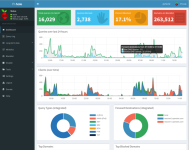What is network wide adblocking?
Most tech savvy users have one form or another of adblock on their devices, usually a browser extension such as uBlock Origin or AdGuard.
Network wide adblocking takes this a step further and blocks ads across your entire network. The advantage to this method is it reduces the amount of time it takes for pages to load - rather than ads loading then being hidden from view, it will, for the most part prevent webpages loading ads at all. This offers a bit of a privacy boost too.
The other advantage is for devices that you can't install an adblocker on such as smart TVs it can reduce the amount of 3rd party advertising, and for phone apps, especially iPhones, you'll usually see next to no ads where there were ads before.
How does it benefit me?
You'll see next to no ads online, and if you're on a slower connection you will spend less time waiting for things to load. It will also help improve your internet privacy by limiting the amount of data 3rd party advertising and tracking companies gather about you making it more difficult for them to build a picture of their browsing habits.
How does it work?
Network wide adblocking uses DNS blocklists. DNS is the system that converts website addresses to server IP addresses, for example translating microsoft.com to 20.53.203.50.
Most advertising services use one common web address, so by telling your browser a nonexistent IP address instead of the actual address where the ads are loaded from, they're quickly blocked.
How easy is it to set up?
There can be some tricky moments when setting up network wide adblocking but for the most part it can be as simple as changing a couple of settings on your laptop or router.
If you're happy to trust a 3rd party for your DNS, then you can simply set your router or computer to use an Adblocking DNS service. There are several free ones such as Adguard DNS and NextDNS. You should do your research on any service you choose to use, as in effect you're handing them a list of all of the websites you or anyone using your connection visits, when you visit them and how often which may cause privacy issues.
Rolling your own
If you want a bit more fine-grained control, you can set up your own adblocking DNS server. The two most popular solutions are Pihole and Adguard Home.
Both of these programs are fairly well regarded and are both open source. Pihole has been around for a lot longer than Adgurad Home, Adguard Home being more of an all in one solution that might perhaps be fractionally easier to set up than Pihole, however Pihole has a lot more scope for customizing things.
The advantage to rolling your own adblocker is you get total control over what's blocked, and optionally you can log what websites are visited. You can even customize what devices have what blocked, for example, you can block social media or Tiktok on your kids devices but retain access for yourself.

The Pihole dashboard
If you choose to go down the Pihole or Adguard Home (not to be confused with Adguard DNS) route than you will need a computer or single board computer such as Raspberry Pi to be always on, and be comfortable getting to grips with your router's DHCP / DNS settings. In some cases you may need to use Adguard or Pihole as your DNS server (both feature this option) if your router doesn't allow you to set a custom DNS server, or alternatively configure all of your devices manually to point to your adblocker.

Adguard Home
Generally though, rolling your own is the better option for privacy, as you can use newer technology such as DNS over HTTPS to help retain a little more privacy from prying eyes such as your ISP without the expense of a VPN.
Consider website ad revenues
It's fair to say that running a website can be expensive, hence the need for advertising. Unfortunately with adblocking becoming more common it's become a bit of an arms race, with advertising getting more and more intrusive on your browsing experience.
For smaller sites, if everybody blocked ads they may no longer be able to operate, so perhaps consider a donation to any smaller sites that you love to visit.dxf
Final thoughts
Personally I've been using Adguard Home for a long time now and wouldn't be without it. I never have been a fan of internet advertising and though I fully understand why websites do it, having operated numerous websites and forums over the years, these days I choose to not run any ads or tracking on this website whatsoever as I know how irritating these are when I'm browsing the net, plus it allows Computer Forums to remain fully independent and unbiased.
Most tech savvy users have one form or another of adblock on their devices, usually a browser extension such as uBlock Origin or AdGuard.
Network wide adblocking takes this a step further and blocks ads across your entire network. The advantage to this method is it reduces the amount of time it takes for pages to load - rather than ads loading then being hidden from view, it will, for the most part prevent webpages loading ads at all. This offers a bit of a privacy boost too.
The other advantage is for devices that you can't install an adblocker on such as smart TVs it can reduce the amount of 3rd party advertising, and for phone apps, especially iPhones, you'll usually see next to no ads where there were ads before.
How does it benefit me?
You'll see next to no ads online, and if you're on a slower connection you will spend less time waiting for things to load. It will also help improve your internet privacy by limiting the amount of data 3rd party advertising and tracking companies gather about you making it more difficult for them to build a picture of their browsing habits.
How does it work?
Network wide adblocking uses DNS blocklists. DNS is the system that converts website addresses to server IP addresses, for example translating microsoft.com to 20.53.203.50.
Most advertising services use one common web address, so by telling your browser a nonexistent IP address instead of the actual address where the ads are loaded from, they're quickly blocked.
How easy is it to set up?
There can be some tricky moments when setting up network wide adblocking but for the most part it can be as simple as changing a couple of settings on your laptop or router.
If you're happy to trust a 3rd party for your DNS, then you can simply set your router or computer to use an Adblocking DNS service. There are several free ones such as Adguard DNS and NextDNS. You should do your research on any service you choose to use, as in effect you're handing them a list of all of the websites you or anyone using your connection visits, when you visit them and how often which may cause privacy issues.
Rolling your own
If you want a bit more fine-grained control, you can set up your own adblocking DNS server. The two most popular solutions are Pihole and Adguard Home.
Both of these programs are fairly well regarded and are both open source. Pihole has been around for a lot longer than Adgurad Home, Adguard Home being more of an all in one solution that might perhaps be fractionally easier to set up than Pihole, however Pihole has a lot more scope for customizing things.
The advantage to rolling your own adblocker is you get total control over what's blocked, and optionally you can log what websites are visited. You can even customize what devices have what blocked, for example, you can block social media or Tiktok on your kids devices but retain access for yourself.

The Pihole dashboard
If you choose to go down the Pihole or Adguard Home (not to be confused with Adguard DNS) route than you will need a computer or single board computer such as Raspberry Pi to be always on, and be comfortable getting to grips with your router's DHCP / DNS settings. In some cases you may need to use Adguard or Pihole as your DNS server (both feature this option) if your router doesn't allow you to set a custom DNS server, or alternatively configure all of your devices manually to point to your adblocker.

Adguard Home
Generally though, rolling your own is the better option for privacy, as you can use newer technology such as DNS over HTTPS to help retain a little more privacy from prying eyes such as your ISP without the expense of a VPN.
Consider website ad revenues
It's fair to say that running a website can be expensive, hence the need for advertising. Unfortunately with adblocking becoming more common it's become a bit of an arms race, with advertising getting more and more intrusive on your browsing experience.
For smaller sites, if everybody blocked ads they may no longer be able to operate, so perhaps consider a donation to any smaller sites that you love to visit.dxf
Final thoughts
Personally I've been using Adguard Home for a long time now and wouldn't be without it. I never have been a fan of internet advertising and though I fully understand why websites do it, having operated numerous websites and forums over the years, these days I choose to not run any ads or tracking on this website whatsoever as I know how irritating these are when I'm browsing the net, plus it allows Computer Forums to remain fully independent and unbiased.
Last edited: